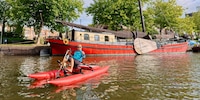

Micro-adventure instead of distant travel: discovering the world on your doorstep
There are lots of adventures waiting for you on your doorstep, even if they don't look like it at first. I'm about to embark on my first micro-adventure.
I've had a lot of adventures. I often owe it to my, shall we say, frivolous nature: on holiday, I like to go exploring for a day without a charged mobile phone battery. And without a powerbank. Another example: Once, at San Francisco airport, I filled in my entry form for the United States so incompletely that a member of security questioned me (even shouted at me) for two hours about my stay in the United States.e) for two hours about my stay Another time, the train tickets from Vienna to Hamburg that I wanted to book just before departure were far too expensive, so I preferred to hitchhike.
These unexpected moments of excitement remind us that life is unpredictable. However, in the hustle and bustle of everyday life, the margin of time to do so is getting smaller and smaller. It's good that someone has come up with adventures that are adapted to everyday life: micro-adventures. These are exciting escapades from normality, in easily digestible doses. They start punctually after work and end shortly before work starts.
Micro-adventure: what is it?
I owe this idea to the British author Alistair Humphreys. He is the author of the book Microadventures in which he coined the term in 2014. In it, Humphreys describes a microadventure as a "local, inexpensive, simple and short adventure", which basically takes place on the doorstep. A newspaper entry in the forest, a spontaneous camping trip on the hill behind the house or a walk in your own town with no destination and no mobile phone.
The basic idea is this: break the routine of everyday life and get out of your comfort zone. "Where there is fear, there is adventure," says another micro-adventure pioneer, podcaster and author Christo Foerster in a interview. In it, he points out that the micro-adventure is an opportunity to ditch the mobile phone and spend time in nature.
Foerster has added his own rules to the concept: for him, the micro-adventure can last between 8 and 72 hours, you don't have to get into a car (let alone a plane) and if you spend the night under the stars, it's only without a tent. Being able to do without aids and transport wherever possible makes perfect sense and triggers a slight tingle in the stomach and a thirst for adventure right from the planning stage.
Find your micro-adventure
In my search for my own tête-à-tête with everyday adventure, I've come across many suggestions: get on a bike and go, ride to the end of the tube or take a night hike. At first glance, many of these things don't seem adventurous to me at all, they're actually pretty mundane. Every week I cycle through the city without a map, because my bike doesn't have a handy holder for my mobile phone and so I ride without navigation most of the time. I also live almost at the end of the metro and, to be honest, the carriages are empty for a good reason: nobody wants to find their way around. I'm not my own worst enemy, either, and it's best if I don't do any late-night rambling during the working week ...
Follow your fear, says Foerster. 'Why can't I just follow the things I love to do? As a child, I loved camping in the garden: I was allowed to invite friends over, we watched the hedgehogs, owls and stars in the sky. To this day, I'm an avid camper and love spending time outdoors. Fortunately, I live in a flat with a small terrace and a view over the communal garden, the ideal place for a micro-adventure. I'm certainly getting out of my comfort zone, but I'm not going very far. In fact, I don't need to go very far: to be precise, I only need to go as far as my terrace.
Equipment: what do I need for the micro-adventure?
The plan is set: a night on my terrace, on the stone floor rather than in a cosy bed. Absolutely not necessary and totally unnecessary, but I suppose that's the point of micro-adventures. I don't need any equipment, at least according to adventurers Humphreys and Foerster. The idea of embarking more or less spontaneously on an everyday adventure is only destroyed by elaborate equipment. Depending on the micro-adventure envisaged, a certain amount of equipment is required: for night hikes, it's certainly not useless to pack a torch, warm clothes, sturdy shoes and a pocket knife.
After work, I equip myself with a sleeping bag, a sleeping mat, a camping stove, crockery and a battery-powered torch. All I have to do is get everything out of the cellar. Then I buy a ready-made meal and cook it on my gas stove. It's 6pm and I spread everything out on my terrace. I add a few candles, a glass of red wine and a good book. What about the mobile phone? I leave it in my comfort zone.
Staycation: what the pandemic has taught us about microadventure
It doesn't take long for the first neighbours to call out to me through the garden fence. Unsurprisingly, it's an unusual sight: wrapped in a sleeping bag, I'm cooking instant noodles over a small gas flame, even though I'm neither locked out of my flat nor confined.
Speaking of staycation, the pandemic has indeed encouraged, at least in the short term, the study of micro-adventures and their impact on us. Jasmine Goodnow, a scientist at Western Washington University, in particular devoted her research to the adventure that took place on her doorstep during the pandemic years. Not surprisingly, borders were closed and travel options were often limited to one's own balcony.
Goodnow's studies show that travel time and distance are less important than getting away from distractions such as email, phone or social media. In this context, the researcher talks about "Depth over Distance": according to this concept, micro-adventures on one's doorstep can lead to a more intense travel experience than distant journeys.
Moreover, micro-adventures are financially and temporally more regular than trips to distant countries. They are therefore more likely to contribute to a good work-life balance than long holidays on the other side of the world.
Micro-adventure in the community garden
Faced with irritated looks from my neighbours, I justify myself by apologising: "I'm just trying things out." As if it were a crime not to fall asleep in front of the TV on a Tuesday night, but under the stars. Four of my near neighbours stay longer in front of my terrace. We chat, I serve wine. As the hours pass, the bustle of the neighbourhood fades and dusk falls. The evening is cool, the wind dies down and the sounds of the city fade. The stars are barely visible because of the city light.
I read my book by the light of candles and street lamps. I see no hedgehogs or owls but a fox creeping over the wall behind the garden. It's big and light orange. I've never seen a fox in real life. At that moment, the passing animal seemed to me to be a mythical creature. The apparition prevents me from falling asleep for a few moments, then I calm my thoughts and close my eyes. In the meantime, I've pulled out my mobile phone: without an alarm clock, I certainly won't wake up from my micro-adventure in time for the start of work.
Conclusion: sore hips and a happy heart
The next morning, waking up feels like a one-night stand. I stand up straight next to my smoking neighbour, with whom I share the garden and who is having her morning coffee. We greet each other shyly. Before I'm even ashamed or silent, I return to my flat. Like the one-night stand, the micro-adventure loses its lustre in the light of day.
After spending the night on a thin mattress, my hips ache. But I suffer even more from having to work for eight hours. A weeknight micro-adventure is harder to deal with than a weekend micro-adventure. Nevertheless, I had an excellent evening. I set myself up as a neon sign in the community garden and my light attracted lots of neighbours and sparked some good discussions.
On other nights, I'd let myself fall asleep to stupid TikTok videos, whereas in the micro-adventure, I felt real emotions instead. I think that's the main advantage of a micro-adventure: getting out of the virtual, two-dimensional world of the Internet, where funny cat videos replace earth-shattering news. Into the real world, on your doorstep. With friendly people, fresh air, situational comedy and a mythical creature. The micro-adventure wasn't particularly exciting, but I feel fulfilled and happy. Micro-adventures make everyday life more colourful and even more important: they open little windows through which you can experience special moments.
Header photo: Shutterstock
I'm a sucker for flowery turns of phrase and allegorical language. Clever metaphors are my Kryptonite – even if, sometimes, it's better to just get to the point. Everything I write is edited by my cat, which I reckon is more «pet humanisation» than metaphor. When I'm not at my desk, I enjoy going hiking, taking part in fireside jamming sessions, dragging my exhausted body out to do some sport and hitting the occasional party.
Interesting facts about products, behind-the-scenes looks at manufacturers and deep-dives on interesting people.
Show all


